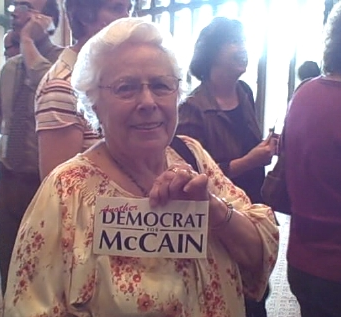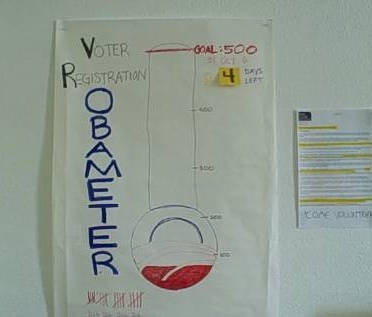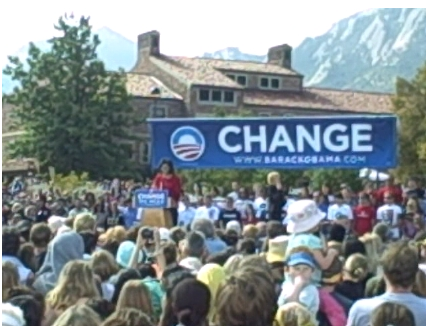
"Without votes in El Paso County, Obama won't win Colorado," says Michael Merrifield, the county representative to the Colorado General Assembly. He is speaking to the small band of Obama volunteers gathered in CJ's Bar & Grill to watch the second presidential debate. Everybody knows what Merrifield means, for they are sipping beers in McCain Country. CJ's is in the heart of El Paso County, in Colorado Springs, which is one of the most conservative communities in the nation. According to the El Paso County clerk's office on October 3, three days out from the close of voter registration, the county has 64,083 active Democrat, 82,245 active Unaffiliated and 131,249 active Republican voters. It's a given that the McCain-Palin ticket will take Colorado Springs and El Paso County. The question is by how much. Three days before the debate, walking up a flight of stairs to the McCain Colorado Victory Headquarters in "the Springs," I can hear the office manager and secretary talking, their voices carrying through the near-empty building. The ladies are discussing a recent phone call from regional HQ up I-25 in Centennial. "They said Obama is going to take Denver and Boulder big," one lady said to the other. "So we have to make up those votes here."
If Colorado Springs is ground zero in the battle for Colorado, the terrain is tricky and shifting. Folks in the Springs have a strong independent and libertarian streak. In the 1992 Election, Ross Perot took 22.6% of the vote here (23.32% in the state). Many of the citizens today are newcomers, and the demographics, like in Colorado as a whole, are trending younger, despite the city's reputation as a haven for retired people. The presence of four military installations in the county creates a significant transient population, as well. (Members of the military themselves are usually registered to vote in their home towns.) In the 1980s, Colorado Springs was Silicon Mountain; after the high-tech bubble burst, non-profits moved in to share the Springs with what remains of the Oracle, Hewlett-Packard and Agilent world. Today there are hundreds of non-profits, thirty-two of which are religious--the most famous being James Dobson's Focus on the Family. According to John Morris, the chairman of the El Paso County Democratic Party, "Family is no longer the spokesperson for the Evangelical vote." Morris says, "Colorado Springs is no longer a black hole of Republican extremism. And our county is changing--to the surprise of outsiders." Indeed that very day Focus on the Family announced the lay-off of 46 workers. The heart of its business is Christian book sales, which Wal-Mart is now winnowing as surely as Obama is voters. .

Morris and I speak at a women's small business roundtable at the Penrose Library in downtown Colorado Springs. The room is crowded with local Democrats come to hear Colorado Governor Ritter and Kansas Governor Sebelius stump for Obama. "Not everyone here is a Democrat," crows Carol Sturman, co-founder of Sturman Industries, which makes energy-efficient industrial valves west of Colorado Springs in Teller County. "I'm sitting here as a registered Republican," Sturman says, "but my husband and I will vote for Barack Obama." The roundtable is just as much about Green Tech as politics. Governor Ritter talks about the Colorado farmers making $4,000 to $5,000 a year leasing land for wind turbines. In answer to a question about the geothermal possibilities in the San Juan River area, Ritter speaks knowledgeably and in detail. "Colorado is the fourth best state for that," he says, with the caveat that developing geothermal energy is still a decade or two in the future. Even now, however, Colorado and its governor are all about Green Tech, which is beginning to move into El Paso County and in the process bring about further change.
The promise and the threat of change, the tension between old and new, ripples up and down the I-25 corridor, from Pueblo and Colorado Springs in the South to Denver and Fort Collins in the North. Here along the Front Range of the Rockies is concentrated most of Colorado's population. The sparser eastern plains and western farms and ranches of the state have been reliably Republican, although this election year Democratic senatorial candidate Mark Udall has a 2% lead over his Republican opponent Bob Schaffer in Western Colorado, even as John McCain holds onto a one-point lead over Barack Obama there. According to Dr. Polly Baca, former State Senator, speaking in a conference call with Michelle Obama last week, Democrats in traditionally Republican Eagle County in Western Colorado are within 350 votes of tying the registration numbers there. "We've had an enormous 501c4 [political committee] drive registering Hispanics," she says. "68% to 70% of Hispanics [statewide] are for Obama."

At the close of voter registration, even though the detailed numbers have not yet been tallied, it is already clear how volatile this election will be in the Centennial State. There are 217,160 newly registered voters. At the same time, about 5,000 registration applications have been returned because on each a small box has not been checked to indicate that a Social Security number is used to verify citizenship--the requirement itself possibly illegal. There have also been questions raised about the dropping of voters from the rolls. In the three weeks after July 21, for example, 37,000 voters were purged from the Colorado rolls, but only 5,100 moved and 2,400 died in that period. More importantly, Colorado election officials do not have the resources to handle a very large turnout. Fortunately, at least a third of voters have requested mail-in ballots. (At the Obama rally in Westminster two weeks ago, almost everyone raised his or her hand as a mail-in voter.)
In the past, Colorado Springs has provided more polling booths in wealthier neighborhoods than in the poor southeastern part of the city, according to Brian Kates, who runs the city's parks and recreation centers. Citizens have had to wait in line seven and eight hours, says Andy Dunham, Professor of Political Science at Colorado College. This season, however, Democrats and Independents have been proactive. For the first time, Colorado College, which is an island of liberalism in the Springs, will have its own polling place. "My students are excited; they want to hold a beer party at the polls," Dunham says, "but I tell them, 'no, no, vote early, vote by mail.'" Professor Dunham is an Obama supporter, and he is worried, thinking that Obama should have more of a lead over McCain in Colorado. (The latest polls: Mason-Dixon October 1, tied 44/44%; FOX/Rasmussen October 5, Obama up 6 points 51/45%; Insider Advantage October 6, Obama up 6 points, 51/45%.) After all, as of September, Democrats had come within 73, 634 voters of Republican dominance. This latest breakdown shows Colorado with 955,428 registered Democrats, 1,029,062 Republicans and 1,022,575 Unaffiliated. The post-registration deadline October tally could be even closer.
The unaffiliated voter is the wild card. At this point, Coloradans can only speculate how that one-third of their electorate will swing, although, as Professor Dunham says, "probably only ten percent of the Unaffiliated are really undecided now." According to the Mason-Dixon poll, the unaffiliated vote is favoring Obama by an 18 point margin. What gives one pause, however, is the data showing that these voters are going for a third party, probably Libertarian Bob Barr, by a significant 9 percent. True to their western heritage, Coloradans like the idea of being independent spirits.
"As a political scientist, I am rarely optimistic," Dunham says. "There is profound cynicism about government here." Douglas Bruce, one of the most famous denizens of the Springs, is an example. "To understand Colorado Springs, you have to start with Bruce," several locals tell me. In 1992, Bruce, a "Ronald Reagan Republican," chivvied TABOR, a state constitutional amendment, to passage. This Taxpayers' Bill of Rights greatly restricts city, county and state tax increases. This November, Colorado Amendment 59 attempts to allocate more money for public education by eliminating certain tax rebates mandated under TABOR. Opponents of 59 are calling it "a permanent tax increase." Even before the current economic crisis, this amendment has been unlikely to pass in November. This resistance to the encroachment of "tax and spend" government is another example of the state's western character that a wash of blue will not change in a season.
In Colorado Springs, where the era of Bruce began, it is already over, however. The libertarian-spirited community has finally approved a few tax increases, "to buy urban space," as Dunham describes it, and, ironically, to improve education. In fact, I meet Brian Kates, the city recreation supervisor who works with middle schoolers in southeast Colorado Springs, at a fundraiser attended by both city Republicans and Democrats, benefiting the "Multicultural Male Retention Initiative" at Pikes Peak Community College. At last, Colorado Springs has awakened to the fact that 80% of its minority male students drop out of college in the first year and has determined to do something about it. Furthermore, the Springs has rejected Bruce himself, appointed last year to a vacant seat in the Colorado House of Representatives but defeated in the 2008 Republican primary by Mark Waller. In its choice for the U.S. House of Representatives, as well, Colorado Springs is poised to reject another incumbent Republican. Doug Lamborn, "roundly hated," according to all the locals with whom I speak, is losing so far to Democratic challenger Hal Bidlack. There are more than a few Bidlack yard signs around town, as there are Obama-Biden signs. Driving around two of the wealthier Springs neighborhoods, I count McCain and Obama yard signs in a ratio of 7 to 3.

The cooling of conservative sentiment in Colorado Springs is a temperature gauge for the state. The harbingers of change--a younger demographic, the waning of old-school Evangelical leadership, the promise of new technology, a willingness, however tentative, to begin rethinking the issue of taxes, a rise in social consciousness and the empowerment of Democrats, with the election of Democratic Senator Ken Salazar in 2004 and Governor Ritter in 2006--should have been a warning to John McCain and his campaign that he needed to secure his western base early on. Despite the fact that Colorado has gone Republican nine times in the last ten presidential elections, the Centennial state, especially given its quixotic attraction to outsiders like Perot, is no longer an Old Reliable for the Republican Party. In the first presidential debate from Oxford, Mississippi, McCain lambasted Obama for not knowing the difference between strategy and tactics; but it is McCain, in his failure to secure Colorado, who has not mastered strategy in 2008. Last March, when Barack Obama and Hillary Clinton were still hotly contesting the Democratic primaries, John McCain, already the presumptive nominee of his party, should have begun to roll out a western strategy. It was clear that, however long the Clinton-Obama contest, Obama would prevail in the end. Even if McCain and his advisors assumed, as they genuinely may have, that Obama would accept public financing for the fall campaign, the size and strength of the Obama operations already on the ground should have signaled that states like Colorado would this time around not be level playing fields.
Tactically, McCain should have used his spring advantage to court Hispanic leaders in Colorado (as he should have done in New Mexico and Nevada as well). With the failure of his immigration bill, this rapprochement would take time; but in April, May and June McCain had time. Despite the differences in their views on domestic drilling, McCain and Obama are equally passionate about a new energy policy for the country that creates jobs to develop emerging technologies. While Obama was mired in a "he said/she said" argument with Clinton over who most strongly opposed storing nuclear waste in Nevada's Yucca Mountain, McCain should have been wooing the green techies in Colorado. McCain could even have demonstrated his oft-vaunted "bi-partisanship" by praising Democratic Governor Ritter's efforts to bring alternative energy to his state. Instead, in a meandering conversation with The Pueblo Chieftain last August, McCain called for renegotiating the 1922 Colorado River Compact and thereby dramatized his obliviousness to the contentiousness of that classic western energy, geographic and political issue: water rights. McCain's recanting a week later not only didn't convince the locals (they brought sipping straws to the McCain rally last week in Pueblo) but also stamped the Western Senator as inauthentic and erratic. Together these two flaws in the McCain persona are a major reason he is losing the presidential race, and the riff in Colorado on the River Compact was at the time a portent of bigger trouble.
Not everything going against McCain in Colorado is his fault. His in-state operations have been slow to mobilize because so many Colorado Republicans supported McCain's opponents, particularly Romney. Only after the Republican Convention and Sarah Palin's acceptance speech did Colorado Republicans start volunteering in force for McCain-Palin. The corollary on the Democratic side would have been if Barack Obama had won the Democratic nomination as a dark horse candidate, much as Lincoln did in 1860, and consequently the organizers and volunteers who had worked so hard for Hillary Clinton had to readjust, rethink and turn themselves around to work for Obama. It takes time to develop momentum anew, and that's what's happened with the RNC ground game in Colorado. Furthermore, the McCain Campaign in Colorado is relying on the tactics that have worked well in the past but may not suffice now.
The Republican get-out-the-vote effort here centers on phone banking. No question the phone banks are more sophisticated than those run by Obama field operatives and volunteers. The RNC has detailed and targeted voter lists (the famous Voter Vault database), and Republicans, seemingly by their very nature, are better organized. The Colorado phone bank events have been elegant affairs, accompanied by "Iron Chef" cook-off dinners, each week a different witty ingredient, such as pork, "for Barack Obama's record of pork barrel spending." These volunteer efforts will culminate in a big voter push the day before the election. The Obama volunteers at CJ's Bar & Grill, by contrast, scramble Crickets and call lists, with a football game blaring in the background, to try to talk to a hodge-podge of voters, many of them McCain supporters, some annoyed at how many times they have already been called.
The McCain troops may be experienced, but they are thin in the ranks. When McCain HQ in Centennial and its press liaison never return my phone calls, I resort to staking out the Victory office in Colorado Springs. Over a weekend, few volunteers come and go. The Obama Campaign, on the other hand, has not only its central office but several outlying locations in Colorado Springs, all with a steady stream of volunteers. A week ago Saturday I tag along for a canvass with two of the Texans who have arrived in town to volunteer for Obama. The sixth Obama canvass I've observed since June 2007, this one unfolds predictably: half the door knocks and rings unanswered (and clearly folks are home, for windows are open), voters moved or absent, whole blocks not receptive to a second opinion. What's remarkable about this canvass is that Joanne and Sara, good friends who have driven from Dallas only the day before, turn three McCain leaners to Obama. There's just something about Texas charm, as many Americans know now only too well. These leaners, retired citizens of modest means who are also consumers of TV political ads, believe that Obama will raise their taxes. Joanne and Sara work patiently to correct this misimpression. After four-and-a-half hours, the ladies have worked through half their canvass sheets. These painstaking, often discouraging neighborhood trudges are what it takes to get out the vote and turn an election. Three votes, even one vote at a time--that's how the Obama Campaign, lifted by the local winds of change, is eroding the Republican vote in El Paso County.
At CJ's Bar & Grill, before the bartender switches one of the big screens from ESPN to CNN for those of us waiting to see the Nashville debate, Julia, the young organizer of the watch party, describes the shift in Springs sensibility. "People are actually saying out loud they are for Obama. I've lived here twenty years, this has never happened. People say, 'I'm thinking about him. Isn't it great we have a choice?'" The context of Julia's remarks is the long-held local fear and hesitation, especially among the older generation, about expressing minority opinion. Just minutes before, Brooke, an Obama supporter and retiree whose mother named her after Brooke Hayward, has said that she and her husband "don't talk politics" with their friends. For older Democrats, silence has meant survival. At the women's business roundtable with Governors Ritter and Sebelius the previous week, longtime resident and local activist Dottie Harmon explained this older community. "Most of my friends are Republicans, so we don't talk politics. But people are quietly saying they're for Obama--especially women--and they're just not telling their husbands." Harmon, like Professor Dunham, went on to express her fears. "We [local Democrats] are a small little group. Sometimes it's like we're talking only to ourselves. What if we don't see what's really happening? Tell me--does Obama have a chance?"
The answer to Dottie Harmon's question lies in the numbers. There is no better example of the laws of inexorable consequence than math. This election season, the quantities--the newly-registered Democrats, the preference of the Unaffiliated, the Republican Obamacans--make it difficult to solve the Colorado equation in any way but for Obama. The story of the change that has come to Colorado Springs merely gives a human dimension to the figures.
----
**Note: As I snaped the photo, the "Obameter" staff said: "Wait! We haven't colored it in up-to-date!"
Next week--Postcards from Colorado: Change Comes to The Holy Land; Centennial Women Against Palin, Or Not; More Texas in Colorado
